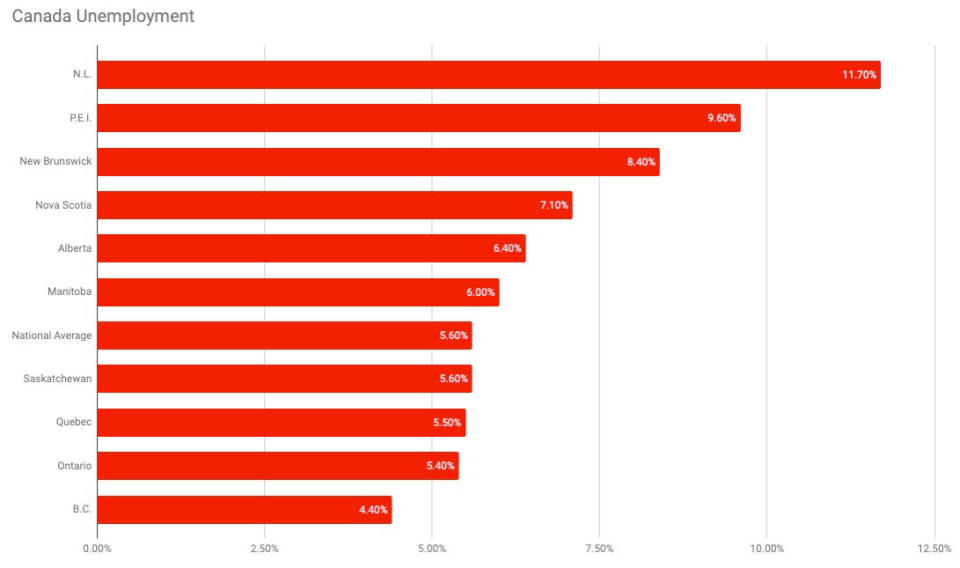Canada adds 9,300 jobs in December, economy 'remains very close to full employment'

The Canadian economy saw job growth slow in December, leaving the unemployment rate unchanged at 5.6 per cent and the Bank of Canada unlikely to hike interest rates in the near future.
After posting record employment gains in November, there were 9,300 new jobs added in the month of December, according to Labour Force Survey data released by Statistics Canada on Friday. The economy saw 28,300 part-time jobs added last month, while the number of full-time employment positions decreased by 18,900. The number of self-employed positions jumped by 46,400.
“Call this one ‘less than meets the eye’,” TD senior economist Brian DePratto wrote in a note on Friday.
“The headline unemployment rate may have defied expectations to remain at a record low 5.6 per cent, but the way we got there was less encouraging.”
Over the full year, employment grew in Canada by 163,000, or 0.1 per cent, with gains largely concentrated in the service industries. The yearly unemployment rate fell 0.2 percentage points in 2018 to 5.6 per cent, the lowest rate since 1976, when comparable data was first available.
Despite the record unemployment, economists agree – don’t expect the Bank of Canada to hike interest rates anytime soon, thanks in part to weak wage growth.
“Overall, what we’re left with is an economy that remains very close to full employment, that’s now grinding out jobs gains roughly in line with labour force growth, and yet wage gains are just managing to roughly track underlying inflation,” Bank of Montreal chief economist Douglas Porter wrote in a research note Friday.
“There’s really nothing in this non-descript report to prompt any near-term response from the Bank of Canada, which is fully expected to stay on hold again at next week’s rate decision, and likely for some time after that.”
While increases in employment were positive, CIBC economist Royce Mendes doesn’t expect the latest results will “do much to brighten the mood in Canadian markets today”, calling some details of the report “far less encouraging.” For example, year-over-year average hourly earnings for permanent workers increased at a rate of 1.5 per cent – which, while solid, is running cooler than other indicators.
“It’s not necessarily a great report, but it’s not a terrible one if that we were able to sustain the job gains we saw in November,” Mendes said in an interview.
“But it’s not so great that the jobs came from part-time and self-employed positions, and it’s certainly not great that wages are still growing at only 1.5 per cent.”
However, he notes that if job creation momentum can continue and wages increase, “consumers should still do their fair share to support GDP growth in 2019.” Meanwhile, he expects the Bank of Canada will focus on the trajectory of oil prices when considering future rate hikes.

DePratto agrees.
“At the moment, there are more pressing matters impacting the Canadian economy,” he wrote.
“However, wages are near the core of the Bank’s mandate. It is definitely not our base case, but without bottom-up wage pressure, further monetary tightening is clearly not urgent.”
British Columbia posted the country’s lowest unemployment rate among the provinces and territories, at 4.4 per cent, followed by Ontario with 5.4 per cent.
But, as noted by BMO Capital Markets senior economist Robert Kavcic, “convergence remains a theme, with Alberta and Atlantic Canada (remaining) sturdy, though unspectacular.” Alberta’s unemployment rate came in at 6.4 per cent, but the province shed 17,000 jobs in December, as losses in full-time work outpaced part-time gains.
Download the Yahoo Finance app, available for Apple and Android.

 Yahoo Finance
Yahoo Finance 